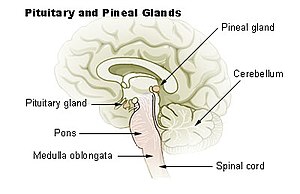Central pontine myelinolysis
| Central pontine myelinolysis | |
|---|---|
 |
|
| Pons labeled at bottom left | |
| Classification and external resources | |
| Specialty | neurology |
| ICD-10 | G37.2 |
| DiseasesDB | 2198 |
| MedlinePlus | 000775 |
| eMedicine | neuro/50 |
| MeSH | D017590 |
Central pontine myelinolysis (CPM), also known as osmotic demyelination syndrome or central pontine demyelination, is a neurological disease caused by severe damage of the myelin sheath of nerve cells in the brainstem, more precisely in the area termed the pons, predominately of iatrogenic etiology. It is characterized by acute paralysis, dysphagia (difficulty swallowing), and dysarthria (difficulty speaking), and other neurological symptoms.
Central pontine myelinolysis was first described by Adams et al in 1958 as a clinicopathological entity.The original paper described four cases with fatal outcomes, and the findings on autopsy. The aetiology was not known then but the authors suspected the cause to be either a toxin or a nutritional deficiency. ‘Central pontine’ indicated the site of the lesion and ‘myelinolysis’ was used to emphasise that myelin was affected preferentially compared to the other neuronal elements. The authors intentionally avoided the term ‘demyelination’ to describe the condition, in order to differentiate the pathology of this condition from multiple sclerosis and other neuroinflammatory disorders in which myelin loss is associated with inflammation.
It can also occur outside the pons. The term "osmotic demyelination syndrome" is similar to "central pontine myelinolysis", but also includes areas outside the pons.
Central pontine myelinolysis presents most commonly as a complication of treatment of patients with profound, life-threatening hyponatremia (low sodium), which may be the result of chronic or untreated polydipsia. It occurs as a consequence of a rapid rise in serum tonicity following treatment in individuals with chronic, severe hyponatremia who have made intracellular adaptations to the prevailing hypotonicity. Hyponatremia should be corrected at a rate of no more than 8-12 mmol/L of sodium per day to prevent central pontine myelinolysis.
Although less common, it may also present in patients with a history of chronic alcoholism or other conditions related to decreased liver function. In these cases, the condition is often unrelated to correction of sodium or electrolyte imbalance.
...
Wikipedia
